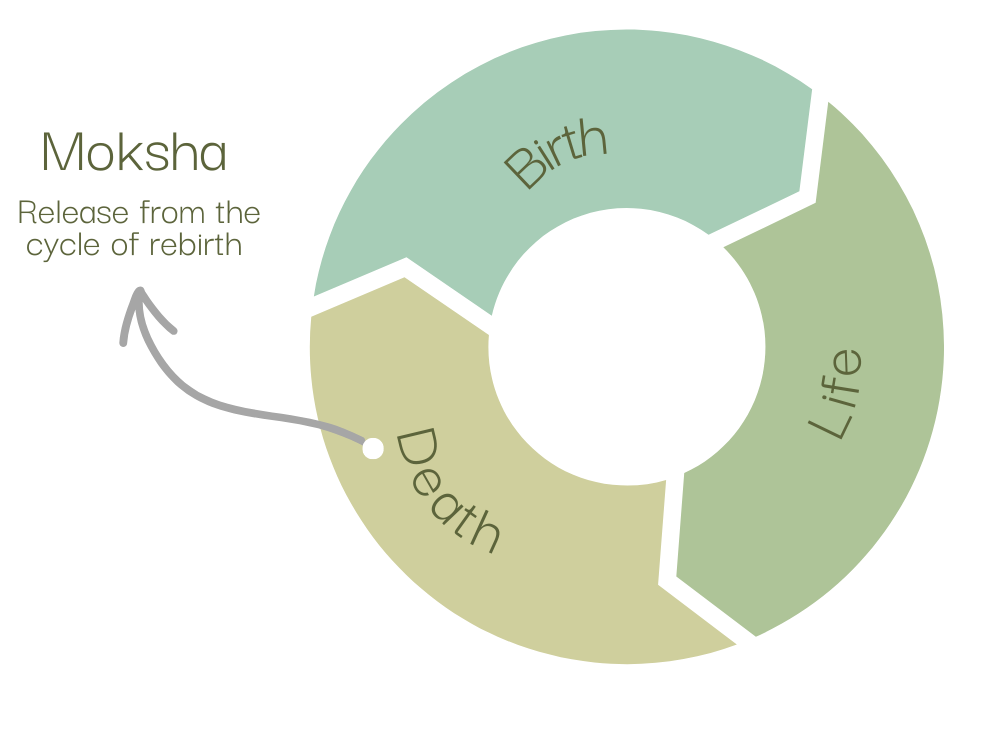Hinduism is not just a religion but rather a way of life. It’s centralized on the concept of reincarnation, dharma, and karma. The ultimate goal of Hinduism is to be free of the cycle of birth and death. As a Hindu, this is what we are all working towards. The practices and rituals of Hinduism are just one step in this process. They better our everyday life and help us all become better Hindus. As we all are trying to get closer to the end goal (free of the cycle of birth and death) rituals will help guide us in the right direction. This why rituals are important in Hinduism.
Hinduism has a few scriptures, laying down the foundation for this way of life. This includes the Bhagavad Gita, the Vedas, the Upanishads and more. In these sacred texts, it shows you how you need to live life in order to be free of the cycle of birth and death. That’s where Hinduism rituals come in. Throughout the Vedas, many different rituals are laid out in great detail. Following these rituals is one of the steps needed to eventually be free of the cycle of birth and death.

Benefits of Hinduism Rituals
Rituals are important in Hinduism because they are believed to bring a person closer to the Devine. The practices laid out in Hinduism’s scriptures are a way of expressing devotion to idols and energies. On top of this, rituals are significant in Hinduism because they help purify the mind and body.
1. Rituals increase your mind-body connection
Rituals are full of music, food, clothes, and songs. They turn Hinduism from an idea to become material and present. Hinduism rituals combine our senses into the religion along with our mind. With rituals, now we can touch, see, smell, hear, and even taste while practicing this religion. We can feel it now. The mind and body are connected. This is why Hinduism has practices for both your physical (such as yoga) and mental (like meditation) parts of you.
In order to free yourself from reincarnation, your body and mind has to be one. This includes the control and purification of both the mind and body. As your practice these rituals, your mind is devoted and becoming purified as is your body. Rituals combine your mind and your body into one. Hinduism practices and rituals are important due to this mind body connection.
2. Rituals calm the mind
Rituals calm the mind and bring focus. Due to this, it removes the wandering mind. Having random thoughts constantly pop into your head is normal. However, this is not always welcome especially when the thoughts are negative. The repetition of prayers and the physical actions in many Hindu rituals bring the mind into a state of concentration. Many rituals also include offerings and other acts of devotion, which redirects the mind towards the positive thoughts. On top of this, rituals require intention. Having an intention in mind will also help the mind focus on the current moment and not get bombarded by other thoughts. It may be even more beneficial to use rituals with meditation and yoga in order to have an even more focused mind.
3. Rituals provide a sense of community
Rituals fill a void in humans that words cannot. A ritual is really just a way of communicating without words. For example, a thumbs up sign is a way to show that you agree. Another example is a handwave to signal that you are a friend and that you notice them. These are all rituals. A ritual is one of the many ways different cultures communicate. Following a specific ritual shows that we are part of a certain community. For example, in India a common ritual is a Namaste gesture. Anyone who performs this gesture shows that they are either a part or an ally of the Indian community.
Many rituals give importance to certain events that may otherwise be unimportant. A birthday party is a common “ritual” that is followed by many people around the world. Both a religious ritual and a birthday party have a set of rules that need to be followed. For instance, all birthday parties need to have a special person who was born on that day. Birthday parties are a celebration that bring the entire community together. Just like this, rituals do the same in a religious settings. A puja, a Hinduism ritual, is a common way for the community to gather and show devotion.
4. Rituals improve discipline and cultivate good qualities
Hindu rituals often involve physical and mental discipline, such as fasting, yoga, or meditation. A repeated practice of these provide so many benefits, like self-control. Hindu rituals also involve the constant repetition of prayers and mantras. These mantras increase wisdom and compassion.

